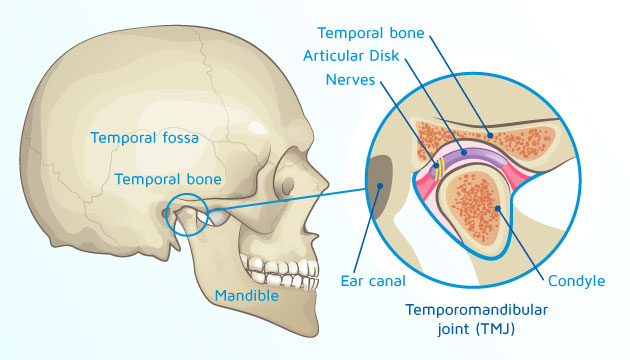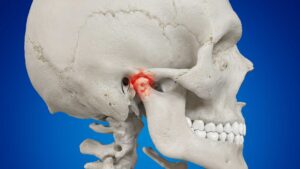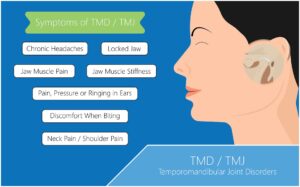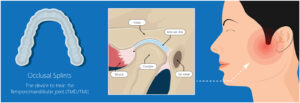
The TemporoMandibular Joint (TMJ) is the joint that connects your jawbone (mandible) to your skull’s temporal bone, located in front of your ear on both sides of your head. It plays a crucial role in various daily activities involving your jaw, such as:
- Chewing: The TMJ allows you to grind and chew food for digestion.
- Speaking: It aids in articulating sounds and words when you talk.
- Yawning: The TMJ enables you to open your mouth wide, as in yawning or singing.
- Facial Expressions: Movements of the jaw contribute to your facial expressions.
Taking care of your TMJ involves several considerations:
Maintain Good Oral Health: Regular dental check-ups and proper oral hygiene help prevent dental issues that can affect the TMJ.
Diet: Eating a balanced diet with soft, easily chewable foods can reduce stress on the TMJ. Avoid excessive chewing of tough or hard foods.
Stress Management: Stress can lead to teeth clenching or grinding, which can strain the TMJ. Practicing stress-reduction techniques, such as meditation or yoga, can help.
Proper Posture: Maintain good posture, especially regarding head and neck alignment, as poor posture can strain the TMJ.
Oral Habits: Avoid habits like nail biting, chewing on non-food items (e.g., pens), or excessive gum chewing, as these can stress the TMJ.
Protect Against Injury: If you play contact sports or engage in activities with a risk of facial injury, wear appropriate protective gear.
Avoid Excessive Jaw Movements: Limit excessive jaw movements like wide yawning or overstretching the jaw.
Stay Hydrated: Dehydration can affect muscle function, including those involved in jaw movement. Drink enough water.
Physical Therapy: If you experience TMJ pain or discomfort, a dentist or specialist may recommend physical therapy exercises to strengthen and relax the jaw muscles.
Custom Mouthguards: In cases of teeth grinding (bruxism), a dentist can provide custom mouthguards to protect the teeth and TMJ during sleep.
If you have persistent or severe TMJ-related issues, consult with a healthcare professional or dentist who specializes in TMJ disorders for a proper diagnosis and personalized treatment plan.







